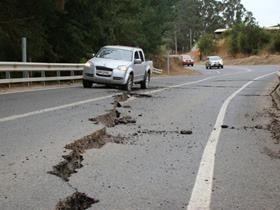
Chilean fruit analyst IQonsulting has released an in-depth analysis of Saturday’s earthquake impact on the South American country’s fruit production and export logistics network.
Avocados:
The 5th Region shows no damage. In the Metropolitan Region some packing plants have damage to machinery. The harvest will be suspended for approximately two weeks. But at this stage of the season it is estimated that this fruit would be delivered to the domestic market.
Table Grapes:
From the San Felipe area to the south, there is expected to be no volume decrease caused by grape vine fallings, except for isolated cases. The greatest difficulty will be the lack of manual labour and services (light, water and communication). The harvest in the 6th Region and Metropolitan Region may face some problems due limited manual labour, but it is expected that fruit will be packed on the orchards or sent to operating packing plants that are located in northern areas.
Transport difficulties are also causing great uncertainty, as well as fruit which was already harvested and stored in damaged coldstores. The overall situation points towards dispatch delays, and may also mean suppliers lose the opportunity to harvest with the appropriate fruit maturity.
Kiwifruit:
The harvesting programme remains as scheduled, and should start around 10-15 March. Some kiwifruit vine fallings were reported in the area of Curicó. For the moment, it is not possible to make an accurate evaluation.
Plums:
The Angeleno variety is being harvested. In some areas, 50 per cent of the fruit on trees dropped, while others report no further damage. The Roysum variety may also be affected, albeit by a lower percentage. Reports are variable.
Peaches and Nectarines:
Fruit drop was reported in the case of Sweet September and Arctic Snow varieties. There are no exact figures available yet. Melipilla (in the Metropolitan Region) is one of the most damaged areas, while the 6th Region reports no serious problems.
Apples and Pears:
At the moment, limited communication means there is no accurate information about the actual situation or when the season will return to normal, although it has clearly been difficult to organise labour this week. Several coldstores are not operating and fruit which was due to be harvested in the 6th and 7th Regions is now expected to be sent to cold chambers located in northern areas. A significant volume of Royal Gala apples, which were due to be harvested in the 6th and 7th Regions, also dropped. There are no exact figures, but estimates point towards a loss of 10-20 per cent. Some fruit drop has also been reported for the Fuji variety.
Pears:
Abate Fetel seems to be the most damaged pear variety across production regions from Rancagua to the south. Around 10-30 per cent of the crop is estimated to have been lost out of the total 55 per cent of fruit still unharvested.
Logistics:
The Ports of Talcahuano, San Vicente and Coronel are not operational until further notice due to damage to facilities and access roads. From the Port of Coquimbo to the north facilities are working as usual.
Severe damage was initially reported at the Port of San Antonio. Facilities are now under evaluation and two of eight piers are working. However, there is very slow discharge and loading, since vessels are moving cargo with their own cranes.
The Port of Valparaíso has returned to partial operation for both cargo and passenger services, working to 90 per cent capacity. Berths 1, 2 and 3 are working; 6 and 8 have partial damage but with running docks, while the remaining three berths (4, 5 and 7) continue to undergo technical evaluation. ZEAL installations, access routes and information systems are functioning normally.
Power failure at both the Port of San Antonio and the Port of Valparaíso would have affected cargoes that were in chambers or reefers waiting to be loaded.
The International Airport of Santiago remains closed to air cargo flights until further notice and cargo operations have been suspended. Only some LAN Cargo flights are operating as of Tuesday 2 March. Other aircraft services are hoped to become operational as of 3 March.
SAG/USDA operations are still unavailable until further notice. Inspections are only being made at the Los Lirios office in Rancagua, which is 100km south-east of Santiago.



